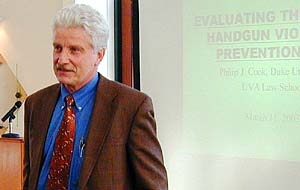Study Shows Brady Bill Had No Impact on Gun Homicides

The Brady Bill, the most important piece of federal gun control legislation in recent decades, has had no statistically discernable effect on reducing gun deaths, according to a study by Philip J. Cook, a Duke University professor of public policy, economics and sociology. "The Brady Bill seems to have been a failure," Cook told an audience in Caplin Pavilion on March 11. "But that doesn't mean gun control is doomed to failure."
Regarded as the nation's foremost authority on gun control, Cook spoke on "Evaluating the Brady Handgun Violence Prevention Act" to inaugurate a new lecture series on public health, law and ethics issues. Elected in 2001 to the prestigious Institute of Medicine, Cook is also known for his work on alcohol problems. In a 1981 study, he demonstrated that alcohol taxes have a direct effect on reducing drinking.
Passed in 1993, the Brady Bill was named for Ronald Reagan's press secretary, James Brady, who was badly wounded in the assassination attempt on Reagan in March 1981. Brady's wife Sarah subsequently became widely known for advocacy of the law and gun control in general.
The Brady Bill had two iterations, Cook explained, but in each the law applies only to handgun sales by federally licensed gun dealers. In the first version, in effect from 1994 to 1997, there were background check and waiting-period provisions. In 1997, the Supreme Court struck down the background check component on 10th Amendment grounds, ruling that the provision usurped states' rights. A new version was passed in 1998, this time covering all guns, instituting an "instant" background check of states' and FBI databases identifying criminals and requiring a three-day waiting period. Fingerprint checks have never been required. At the time it first passed, the law obliged 32 states to change laws to come into conformity. Laws in 18 states were already in compliance and these made an ideal control group for a study, Cook said. Following the 1998 revision only two statesOhio and Arkansasdid not reestablish background checks, but Cook said they nonetheless remained in the group considered "treatment" states by the study.
Data shows a slow gradual decline in gun homicides from 1993 to the present, a trend that started before the Brady Bill passed, but figures from both the control and treatment states track virtually identically. "Control and treatment states had the same gun homicide rates before and after the Brady law passed," Cook said. "It made no discernable difference. There is no statistically significant effect."
Data on gun suicides showed the same trends, though Cook said there is "some hint of an effect" on the gun suicide rate for persons over age 55, some of whom appear to be deterred by the waiting period. But overall suicide rates do not decline, suggesting that some people simply changed their method when they couldn't get a gun more easily.
Cook, who acknowledged that his personal sympathies are for gun control, said, "Maybe the law did save a handful of lives, a couple hundred per year," and that other public health and safety laws are enacted to save similar numbers of lives.
On the plus side, there is strong evidence that the law undermined gun-running operations that were buying large numbers of guns in southern states and transporting them north for resale, he said. The law has also helped improve criminal history records. Proponents of the law also point to the 60,000 people trying to buy guns who were turned down after background checks revealed that they were felons. But a later California study showed that the turndowns had no effect on criminal activity.
Cook said the real problem is the law's "gaping barn door" for unregulated sales, mainly at gun shows, but no one knows how many guns are bought with false IDs or exchanged privately, to say nothing of those being stolen.
He praised an Illinois law that requires gun owners to have ID cards and to record the ID numbers of individuals they sell guns to. Failure to keep records or report a stolen gun can result in prosecution. Cook also endorsed gun locks as a cheap and sensible way to render guns useless except to the owner.
Founded in 1819, the University of Virginia School of Law is the second-oldest continuously operating law school in the nation. Consistently ranked among the top law schools, Virginia is a world-renowned training ground for distinguished lawyers and public servants, instilling in them a commitment to leadership, integrity and community service.


